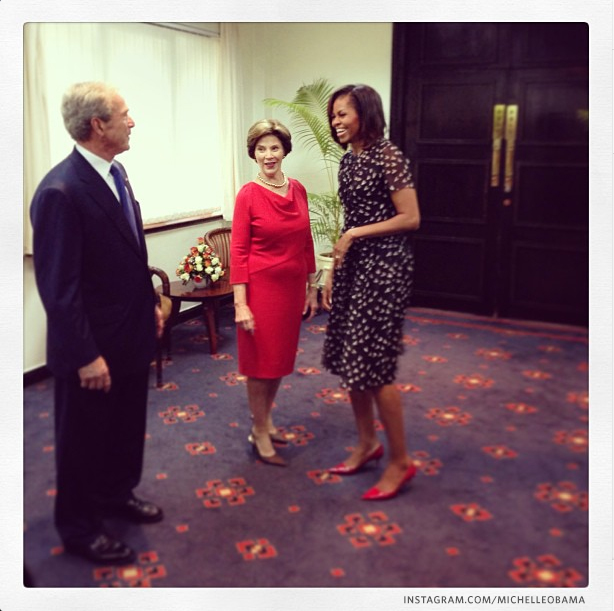
Today, I had the pleasure and honor of ending our trip by attending an African First Ladies Summit entitled “Investing in Women: Strengthening Africa” which was co-sponsored by our former First Lady, Mrs. Laura Bush. There are so few people in the world who know what it feels like to be married to the President of the United States, and Mrs. Bush has been so incredibly kind and welcoming to me and my family over the years. So I was thrilled to have the chance to see her and her husband, President Bush, and to attend this very important event.
Upon arrival, I got to meet First Ladies from countries all across Africa who came here to Tanzania for this summit. These women are doing extraordinary work in their home countries – from raising awareness about HIV/AIDS, to fighting violence against women, to working to end child hunger – and it was inspiring to learn about the difference they are making across this continent.
I then had a lively discussion with Mrs. Bush about the impact that First Ladies can have on the important issues this conference is focused on: women’s health, women’s economic empowerment, and education for women and girls. This last issue is particularly near and dear to my heart and has been part of my focus throughout this trip.
The fact is that too often, in developing countries, girls simply don’t get the chance to attend school. In some parts of Africa, fewer than 20% of girls ever attend high school.
There are many reasons for this education gender gap. Sometimes, girls’ families simply can’t afford the costs of sending them to school (for things like school fees, uniforms, or school supplies). Or if parents don’t have enough money to send all their children to school, they’ll send their sons instead of their daughters. In some parts of the world, girls are expected to get married when they’re very young – when they’re teenagers or even younger – or they have to work to help support their families, so they can’t go to school. And in some places, a girl may have to walk many miles to attend the nearest school, and it may not be safe for her to do that by herself.
So while you may face challenges in your life here in the U.S., chances are that it's much easier for you to get your education than it is for so many girls around the world. That's why it's so important for girls – and all young people – here in the U.S. to take advantage of the opportunities you have. You might not love every class you take, or every teacher you have, but it's so important to show up everyday, for every class, and learn everything you can. Find a subject you're passionate about, and push yourself to learn even more than what you're studying in school. If you're struggling or falling behind, find a teacher, coach or counselor who can help. If you encounter people who doubt that you have what it takes to succeed, tune them out and then prove them wrong. In short, do whatever you need to do to get the very best education you can.
But we know that when girls get an education, that’s not just good for them, it’s good for their families and their countries too. Studies show that when girls are educated at least through high school, they are healthier and have children later in life – and their children grow up healthier and better educated as well. In addition, just one extra year of high school boosts a girl’s eventual wages by up to 25 percent, and when girls are educated, that boosts their countries’ economies as well.
Fortunately, more and more people are becoming aware of these facts – sometimes known as “the girl effect” – and are working hard to help more girls get the education they need. Mrs. Bush has been doing excellent work on this issue, as have many of the First Ladies I met and so many other individuals and organizations around the world. I’m excited to be part of this movement – and I hope you will be too.
Michelle Obama is First Lady of the United States
See more travel journals from the First Lady:
- June 26, 2013: Kicking Off Our Trip to Africa
- June 27, 2013: An Example to Follow
- June 27, 2013: Visiting Goree Island
- June 28, 2013: My Return to South Africa
- June 29, 2013: Connecting Continents
- June 30, 2013: Robben Island, an Experience We Will Never Forget
- July 1, 2013: A Warm Welcome to Tanzania




